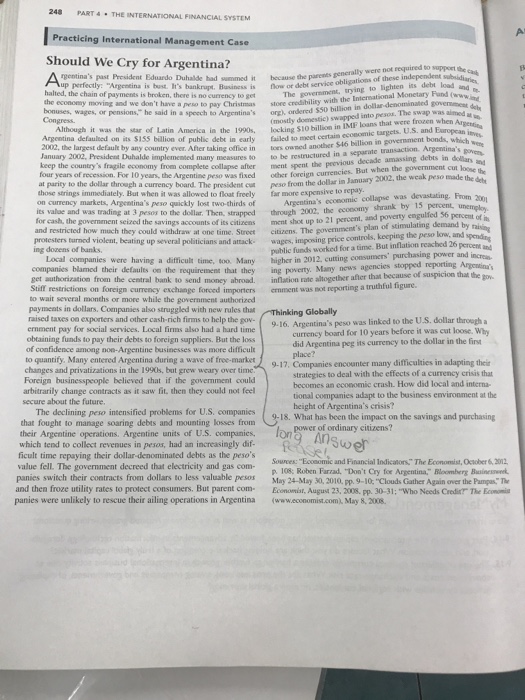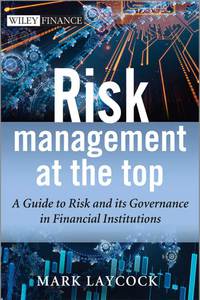248 PART4THE INTERNATIONAL FINANCIAL SYSTEM Practicing International Management Case Should We Cry for Argentina? heause the parents generally were not required to support Duhalde had suramed it halted, the chain of payments is broken, there is no currency to get up perfectly: "Argentina is bust. It's bankrupt. Business is fow or debt servce bonuses, wages, or pensions." he said in a speech to Argentina's orgh Argentina defaulied on its $155 billion of public debe in early failed to meet certarsi6 billion in trying to lighten its debt load aai or pensions, he eitaso to pay Christsas store credsbility with the International Monetary Fund (www (mostly domestic) swapped into pesos. The swap was aimed The government. ordered $50 billion in dolan-denominated gove eratehe star of Latin America in the 1990s, locking S10 billion in IMF loans that were frozen when A ecomomic targets. U.S. nd Europcan 2002, the largest default by any country ever. After taking office in January 2002, President Duhalde implemented many measures to toes owned another to be restructured in a separate transaction economy fromm complete collapse after ment spent the peevious decade amassing debts in dollar currencies. But when the government cut ooe four years of recession. For 10 years, the Argentine peso was fixed other forcign at parity to the dollar through a currency board. The presidknt cut peso from the dollar in January 2002, the weak peso made the det peso frem the far more expensive to repay it was allowed to float freely on currency markets, Argentina's peso quickly lost two-thirds of Argentina's economic collapse was devastating. From its value and was trading at 3 pesos to the dollar. Then, strapped through 2002, the ecomy and poverty engulfed 56 percent of i for cash, the government seized the savings accounts of its citizens and restricted how much they could withdraw at one time. Street ment shot up to 21 percent, citizens. The gov protesters turned violent, beating up several politicians and attack. wages, imposing price com companies blamed their defaults on the requirement that they ing poverty. Many news agenciess Stiff restrictions on foreign currency exchange forced importers ermment was not reporting a truthtu and attackwages, imposing price controls, keeping the peso low, and public funds worked for a time. But inflation reached 26 Local companies were having a difficult time, too. Many higher in 2012, cutting consumcrs topped reporting Arpentinu after that because of suspicion that the gor get authorization from the central bank to send money abroad to wait several months or more while the government authorized payments in dollars, Companies also struggled with new rules tha Thinking Globally raised taxes on exporters and other cash-rich firms to help the govg9-16. Argentina's peso was linked to the U.S. dollar throogh a ernment pay for social services. Local firms also had a hard time obtaining funds to pay their debts to foreign sappliers. But the loss of confidence among non-Argentine businesses was more difficult to quantify. Many entered Argentina during a wave of free-market currency board for 10 years before it was cut loose did Argentina peg its currency to the dollar in the first 9-17, Companies encounter many difficulties in adapting their changes and privatizations in the 1990s, but grew weary over time. Foreign businesspeople believed that if the government could arbitrarily change contracts as it saw fit, then they could not feel strategies to deal with the effects of a currency crisis that becomes an cconomic crash. How did local and interna tional companies adapt to the business environment at the The declining peso intensified problems for U.S. companies that fought to manage soaring debts and mounting losses from 18. What has been the impact on the savings and purchasing power of ordinary citizens? their Argentine operations. Argentine units of U.S. companies, Ton which tend to collect revenues in pesos, had an increasingly dif. ficult time repaying their dollar-denominated debts as the peso's Souces:"Ecsomic and B Financial Indicators" The Economist,Ocsober2012 value fell. The government decreed that electricity and gas com panies switch their contracts from dollars to less valuable pesos and then froze utility rates to protect consumers. But parent con- panies were unlikely to rescue their ailing operations in Argentina p. 10, Roten Farzad"Don't Cry fx Argentina" Blomberg Buiinrmeek, May 24-May 30, 2010, pp. S Eon (www.economistcom. May20s. "Clouds Gather Again over the Pampas Th it. Aug N 23, OOS, pp. 30 31: "Who Needs Credral







